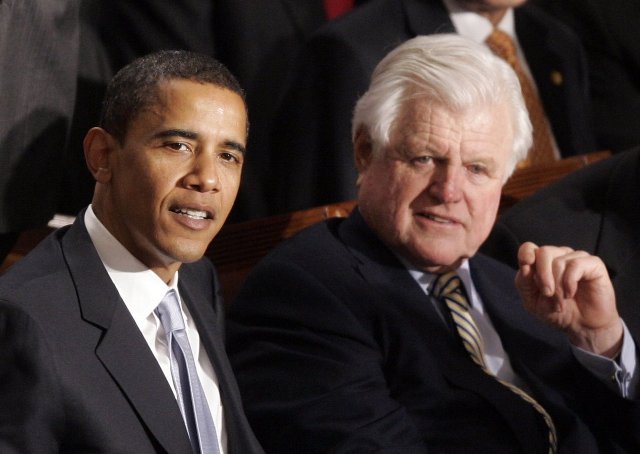When I think of Ted Kennedy, I think of a line of Democrats that reach way back to FDR. The wealthy elites who are brought up to serve the public and for my money, demonstrate a commitment to a progressive agenda that is centered in social justice. Were they perfect, of course not. From FDR to Teddy Kennedy. Was Teddy the end of the line?
I was watching some of Ted Kennedy’s speeches this morning. The one I didn’t see was the one I remember most of all: his eulogy of his brother Robert. It was a powerful, iconic moment in American history.
If you look and listen during these days of remembrance and tribute, there is something different in his passion and compassion than you find in almost all of the elected representatives: a light in the eyes, a fierce fight for his agenda and values. There is a song in his voice too, a song that I hadn’t heard from anyone else for a long, long time, at least until Barack Obama appeared on the national stage.
Even though they should, many people do not know how how much of NCLB was Teddy Kennedy. When George W. Bush said that he would reach across the aisles to work with the democrats, NCLB was perhaps the most significant evidence of his making good on that pledge.
NCLB is roundly rejected within the arts education community, and in many, many other quarters. What is lost on many of the opponents of NCLB is that it is favored by more people than a group of conservatives. NCLB has had some pretty strong support within low economic urban schools communities, where the local school districts have often failed to provide a sound, basic education. The focus on performance, for many of the parents in these schools, was perhaps the first time in a long time they saw standards and achievement being pushed, measured, and tied to consequences. That focus has meant something to a lot of people.
This is often lost in the din of those who want NCLB ended or significantly overhauled.
Now don’t get me wrong: I am not defending NCLB, but rather trying to provide a fair statement as to the side that supports it and why.
While President Obama was highly critical of NCLB on the campaign trail, many people believe that the administration is closely tied to its fundamental premise and will seek to improve it rather shut it down. Politically, that may be a wise move. Without diverting this blog to being about how to improve NCLB, I will simply say for the moment that significantly improving NCLB is much more than tweaking its engine, as there are many, many complicated pieces that would have to be put in place across all fifty states to make a better engine work.
We should get a better sense soon of how this will all shape up.
All of this bring me to a feature on NEA Chair Rocco Landesman in today”s Washington Post:
As for schools, they should encourage young people to soar, not just
study for a test. He sneers at the goals of No Child Left Behind, which
seem to have little use for arts education. “All the tests don’t take
into account personal creativity. There is something very American
about individualism,” he said.
After the Bush years, where for the most part the message across the administration was very uniform, and the Bloomberg years in New York City, where the message is completely uniform, it’s interesting to see the NEA Chair sneering at the goals of NCLB.
While I have no bone to pick with the goals of NCLB, which is why I think Teddy Kennedy was so much a part of creating and defending it, it is unquestionably a matter of implementation rather than goals.
That being said, it will be very interesting to see how much leeway Landesman is given to press education policy. Will he be reigned in or be the firebrand? Will he become, in effect, the arts czar that many people lobbied for??




